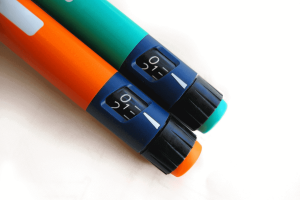Vitamins for Diabetes
Many of us probably remember taking a Flintstones vitamin, or something similar, as a child. But as we get older, are vitamins still important for us to take? And how about all those “natural” drugs that claim to fight diabetes? Here are a few things you should know about vitamins, minerals, and your diabetes.
How important are vitamins for diabetes?
According to the American Diabetes Association’s Standards of Medical Care, people with diabetes get no extra benefits from taking a multivitamin, compared to people without diabetes. Any supplement or vitamin that is recommended for the general public is also recommended for people with diabetes.
Who may need to take vitamins?
Multivitamins are supplements are just what they claim to be–supplemental. They are used to help people boost their diets when they are not receiving enough nutrients from food alone. These types of people could include pregnant women and people on special diets (such as low-calorie, gluten-free, vegan, vegetarian, and more). If you think you may suffer from a nutritional deficiency, you should always follow up with your doctor to see if a multivitamin or supplement may be right for you. However, if you follow the My Plate balanced diet or a similar diet plan created by a doctor, dietitian, or certified diabetes educator, you should be receiving the right amount of nutrients for your body!
If you choose to take a vitamin or supplement:
The Joslin Diabetes Center recommends choosing a vitamin with no more than 100 to 150 percent of the daily value listed for vitamins and minerals. One nutrient people with diabetes may need more of is Vitamin D. According to the Joslin Diabetes Center, Vitamin D promotes the growth of healthy bones, and it may help with blood glucose control. Many people are able to get enough Vitamin D from the sun, but a supplement may help those who live in a cold or dark climate. During winter time in Iowa, it may be beneficial to take a Vitamin D supplement.
Are there any side effects of taking vitamins?
It is possible to have too much of a good thing, nutrients included. According to WebMD, there’s no benefit from giving your body more than the daily recommended amount of a nutrient. That means bringing in 150 percent of the daily recommended amount of a specific vitamin is no better than bringing in 100 percent. While it’s difficult, it is possible to overdo it. One of the most popular nutrients that people can get too much of is iron. Getting more than the recommended amount can lead to dizziness, fatigue, and severe headache–all signs of iron poisoning. That’s why it is recommend to get your nutrients the natural way–from a healthy diet–before turning to a supplement.
Summary
While there are not special vitamins for diabetes, there are reasons why people with diabetes might want to take them. For instance, if they have a deficiency in a nutrient, such as Vitamin D. Always use caution, as you can overdo it on vitamins and supplements. Make sure the vitamin includes no more than 100 to 150% of the daily requirement.
Disclaimer Statement: This is for educational purposes only and not intended as medical advice. For individual medical advice, contact your healthcare practitioner.




